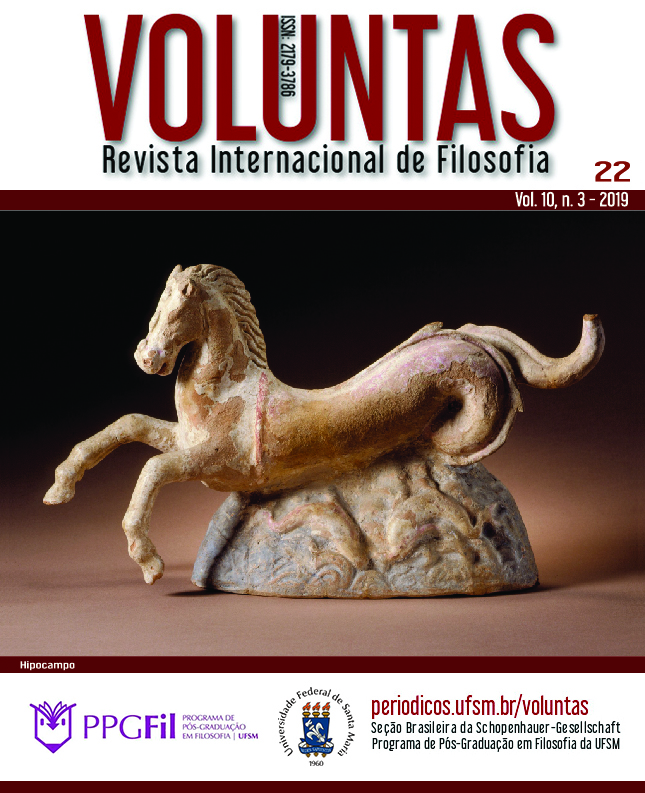Amnésia psicogênica: implicações para o senso de si mesmo diacrônico
DOI:
https://doi.org/10.5902/2179378640389Palavras-chave:
Memória Episódica, Sensação de Si Mesmo Diacrônico, DissociaçãoResumo
Tradicionalmente, a questão da identidade pessoal é considerada a questão a respeito ao que faz uma pessoa ser a mesma ao longo do tempo. Recentemente, porém, atenção à experiência fenomênica trouxe uma nova perspectiva ao debate. À luz dessa mudança de perspectiva, Klein sugere que indivíduos com amnésia episódica retrógrada retêm uma noção de quem são, além de terem senso de continuidade. Ele, portanto, argumenta que a memória episódica não é necessária para se ter sensação de si mesmo diacrônica. Desafiamos a conclusão de Klein apontando que existem tipos mais extremos de amnésia—amnésia psicogênica—que parecem problemáticos à sua proposta de que o senso de continuidade é suficiente para se ter sensação de si mesmo diacrônico. Esse é o caso, porque alguns exemplos de amnésia psicogênica são casos de amnésia dissociativa, que mostram que ter uma experiência consciente contínua não resolve o problema.
Downloads
Referências
BRAND, Matthias; EGGERS, Carsten; REINHOLD, Nadine; FUJIWARA, Esther; KESSLER, Josef; HEISS, Wolf-Dieter; MARKOWITSCH, Hans J. Functional brain imaging in 14 patients with dissociative amnesia reveals right inferolateral prefrontal hypometabolism. Psychiatry Research: Neuroimaging, v. 174, p. 32-39, 2009.
BRENNER, Ira. Deconstructing DID. American Journal of Psychotherapy, v. 53, n. 3, p. 344-360, 1999.
BUTLER, J. The Analogy of Religion, Natural and Revealed, to the Constitution and Course of Nature. London: James, John, and Paul Knapton. Reprinted New York: Robert Carter, 1736 [1842]. Available via https://archive.org/details/worksofrightreve00butl/page/n305. Retrieved 02 Sep, 2019.
DE BRIGARD, Felipe. Is memory for remembering? Recollection as a form of episodic hypothetical thinking. Synthese, v. 191, n. 2, p. 155-185, 2014.
HUME, David. A treatise of human nature, Book I. L. Ed. A. Selby-Bigge. Oxford: Claredon Press, 1896[1739].
KEAN, Clara. Silencing the self: Schizophrenia as a self-disturbance. Schizophr Bull, v. 35, n. 06, p. 1034–1036, 2009.
KLEIN, Stanley. Self and its brain. Social Cognition, v. 30, n. 4, p. 474-518, 2012.
KLEIN, Stanley. The sense of diachronic personal identity. Phenomenology and the Cognitive Sciences, v. 12, n. 4, p. 791-811, 2013.
KLEIN, Stanley; GANGI, Cynthia E. The multiplicity of self: neuropsychological evidence and its implications for the self as a construct in psychological research. Annals of The New York Academy of Sciences, v. 1191, p. 1-15, 2010.
KLEIN, Stanley.; NICHOLS, Shaun. Memory and the sense of personal identity. Mind, v. 121, n. 483, p. 677-702, 2012.
LOCKE, John. An essay concerning human understanding Book II: Ideas (J. Bennett ed.). 2017. Available via https://www.earlymoderntexts.com/assets/pdfs/locke1690book2.pdf. Retrieved 14 Aug 2018. (Original work published 1689)
MARKOWITSCH, Hans J.; FINK, Georg R.; THONE, Angelika; KESSLER, Josef; HEISS, Wolf-Dieter. A PET study of persistent psychogenic amnesia covering the whole life span. Cognitive Neuropsychiatry, v. 2, n. 2, p. 135-158, 1997.
MICHAELIAN, Kourken. Mental time travel: episodic memory and our knowledge of the personal past. Cambridge: MIT Press, 2016.
PARFIT, Derek. Reasons and Persons. Oxford: Claredon Press, 1984.
REINHOLD, Nadine; MARKOWITSCHE, Hans J. Retrograde episodic memory and emotion: A perspective from patients with dissociative amnesia. Neuropsychologia, v. 47, p. 2197-2206, 2009.
SANT’ANNA, André. Mental time travel and the philosophy of memory. Unisinos Journal of Philosophy, v. 19, n. 1, p. 52–62, 2018.
SCHACTER, Daniel, & ADDIS, Donna Rose. The cognitive neuroscience of constructive memory: remembering the past and imagining the future. Philosophical Transactions of The Royal Society B, v. 362, p. 773-786, 2007.
STANILOIU, Angelica, MARKOWITSCH, Hans J. The remains of the day in dissociative amnesia. Brain Sciences, v. 2, p. 101-129, 2012.
STANILOIU, Angelica; MARKOWITSCH, Hans J. Long lasting personality changes after the onset of dissociative amnesia. European Psychiatry, v. 28, n. 1, p. 1, 2013.
STANILOIU, Angelica; MARKOWITSCH, Hans J.; BRAND, Matthias. Psychogenic amnesia – A malady of the constricted self. Consciousness and Cognition, v. 19, p. 778-801, 2010.
STANILOIU, Angelica; MARKOWITSCH, Hans J.; KORDON, Andreas. Psychological causes of autobiographical amnesia: A study of 28 cases. Neuropsychologia, v. 110, p. 134-147,
SUDDENDORF, Thomas, ADDIS, Donna Rose, CORBALLIS, Michael. Mental time travel and the shaping of the human mind. Philosophical Transactions of The Royal Society B, v. 364, p. 1317-1324, 2009.
TULVING, Endel. Episodic memory: From mind to brain. Annu. Rev. Psychol, v. 53, p. 1-25, 2002.
Downloads
Publicado
Como Citar
Edição
Seção
Licença
A submissão de originais para este periódico implica na transferência, pelos autores, dos direitos de publicação impressa e digital. Os direitos autorais para os artigos publicados são do autor, com direitos do periódico sobre a primeira publicação. Os autores somente poderão utilizar os mesmos resultados em outras publicações indicando claramente este periódico como o meio da publicação original.
A Voluntas é um periódico de acesso aberto sob a licença Creative Commons Atribuição-NãoComercial-CompartilhaIgual 4.0 Internacional (CC BY-NC-SA 4.0).






